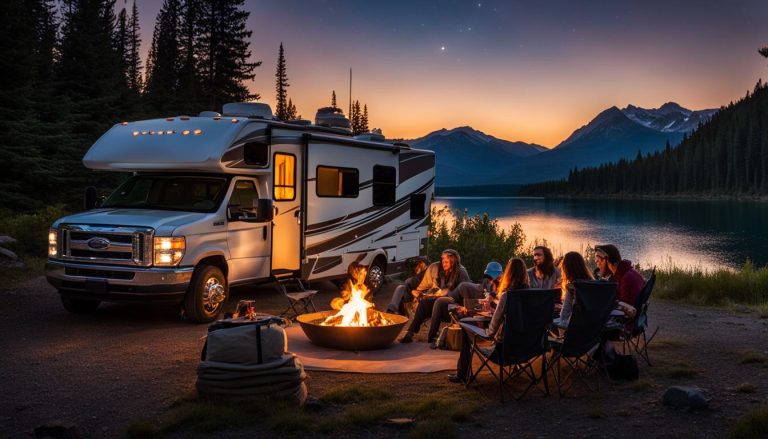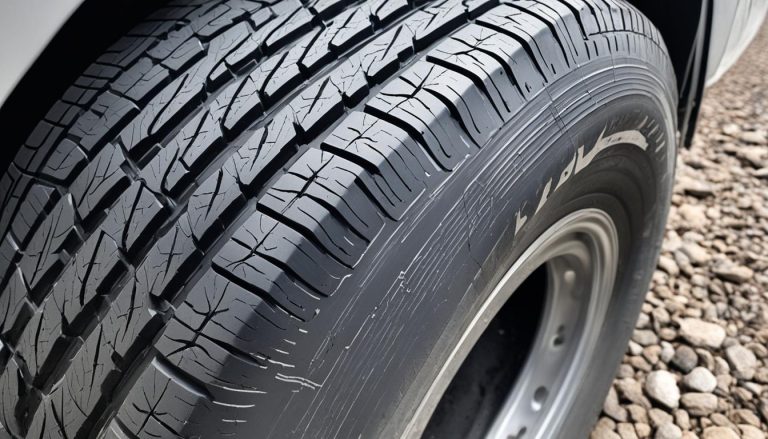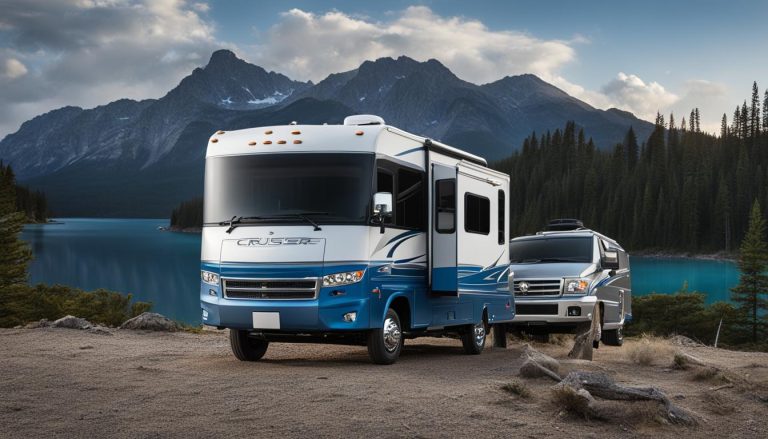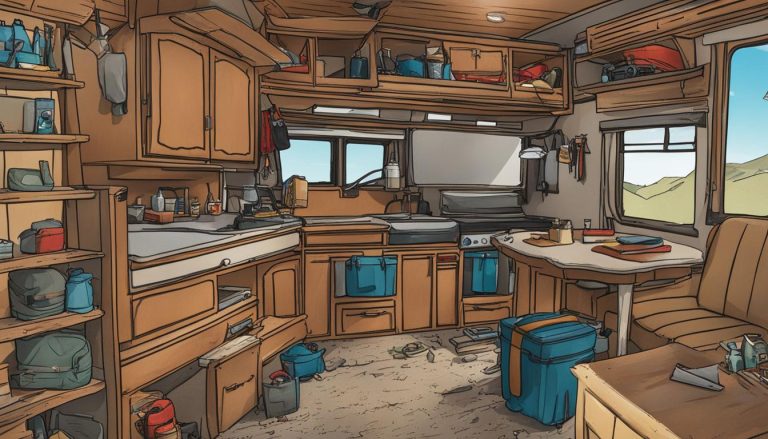Master Class C RV Driving with Ease
gorvlifestyle.com and its partners may earn a commission if you purchase a product through one of our links
Are you ready to hit the open road and embark on exciting adventures in your Class C RV? Whether you’re a first-time RVer or a seasoned traveler, mastering the art of driving a Class C motorhome can make your journey even more enjoyable. In this guide, we’ll provide you with valuable tips and techniques to help you drive your Class C RV with ease.
Class C RVs are the perfect choice for those seeking the comfort and amenities of a motorhome with the convenience of easy driving. Built on a truck chassis, these mid-range motorhomes offer maneuverability similar to that of a large pickup truck. Their compact size allows for easier parking and navigating through tight spaces, making them ideal for both city streets and campgrounds.
But how do you ensure a smooth and safe drive in your Class C RV? Let’s dive into some driving tips and techniques that will make you feel confident behind the wheel.
Key Takeaways:
- Class C RVs are a popular choice for their affordability, ease of engine maintenance, and towing capabilities.
- Class C motorhomes offer the best of both worlds, providing the space of a Class A RV with the maneuverability of a Class B.
- Driving a Class C RV is similar to driving a large pickup truck, but beginners should familiarize themselves with RV driving techniques and safety tips.
- Consider the benefits of Class C RVs, such as additional sleeping space and the ability to tow an extra vehicle.
- An older Class C RV can be a budget-friendly option, but thorough inspection and maintenance are necessary.
Benefits of Class C RVs
When it comes to RVing, Class C motorhomes offer numerous advantages that make them a popular choice. From their affordability to convenience, choosing a Class C RV can enhance your camping experience. Here are the key benefits of Class C RVs:
Affordability
Class C RVs provide all the essential amenities for camping at a more reasonable price compared to their larger counterparts, such as Class A motorhomes. If you’re on a budget, a Class C RV is a great option to consider.
Ease of Maintenance
Unlike some RV classes, Class C motorhomes are easier to work on and maintain. Many mechanics are familiar with the Ford or Chevrolet engines commonly used in these RVs, making repairs and maintenance more accessible and affordable.
Additional Sleeping Space
Class C RVs offer versatile sleeping arrangements, thanks to features like the cab-over bunk and slide-out rooms. These extra sleeping spaces are perfect for accommodating family and friends during your camping adventures.
Towing Capabilities
One of the significant advantages of Class C RVs is their towing capabilities. With the ability to tow an extra vehicle, you can bring along a smaller, more fuel-efficient car for everyday travel, providing added convenience and flexibility.
Easy to Drive
Driving a Class C RV is generally easier compared to larger motorhomes. It’s similar to driving a large pickup truck, making it accessible for beginners or those who may be apprehensive about driving a more substantial vehicle.
To ensure a smooth and safe journey, it’s important for beginners to familiarize themselves with RV driving techniques and safety tips. Understanding how to operate an RV Class C, especially if you’re new to RVing, will give you the confidence and knowledge you need to navigate the roads with ease.
| RV Driving Safety Tips |
|---|
| 1. Always perform a pre-departure inspection to ensure your RV is in proper working condition. |
| 2. Practice maneuvering your RV in an open area before hitting the road to get comfortable with its size and handling. |
| 3. Maintain a safe following distance and avoid sudden braking to allow for longer stopping distances. |
| 4. Be mindful of the RV’s height and check for clearance when passing under bridges or other low obstacles. |
| 5. Use your RV’s mirrors effectively to monitor surrounding traffic and ensure proper lane positioning. |
| 6. Take advantage of rest stops to alleviate driver fatigue and give yourself regular breaks during long drives. |
| 7. Plan your route in advance, considering low clearance bridges, traffic, and suitable RV-friendly campgrounds. |
Why You Should Consider an Older Class C RV
When it comes to starting your RV journey on a budget, older Class C RVs can be a smart choice. These vehicles offer several advantages that make them worth considering. One major benefit is that older Class C RVs are often easier to work on and find parts for, making maintenance more affordable. This is especially important if you plan on doing repairs and upgrades yourself.
In addition, Class C RVs with larger engines have the towing capacity to bring along a smaller, more fuel-efficient car for everyday travel. This allows you to minimize driving the RV and save on fuel costs. Plus, having a separate vehicle can make it easier to explore your destination without the need to constantly move the RV.
Owning an older Class C RV also gives you the opportunity to gradually work on repairs and upgrades at your own pace and within your budget. You can customize your RV to suit your needs and preferences over time, without the pressure of completing everything at once. This flexibility is especially helpful if you’re new to RVing and want to take it step-by-step.
Before purchasing an older Class C RV, it’s essential to thoroughly inspect the vehicle for any hidden damages or issues. This inspection can help you avoid expensive repairs down the road. Taking the time to learn how to handle and drive an older Class C RV is also crucial. Getting familiar with the vehicle’s mechanics and practicing safe driving techniques will ensure a smooth and enjoyable RVing experience.
Consider the benefits of an older Class C RV and weigh them against your own needs and budget. With the right research and preparation, you can find a well-maintained older RV that allows you to embark on unforgettable adventures without breaking the bank.
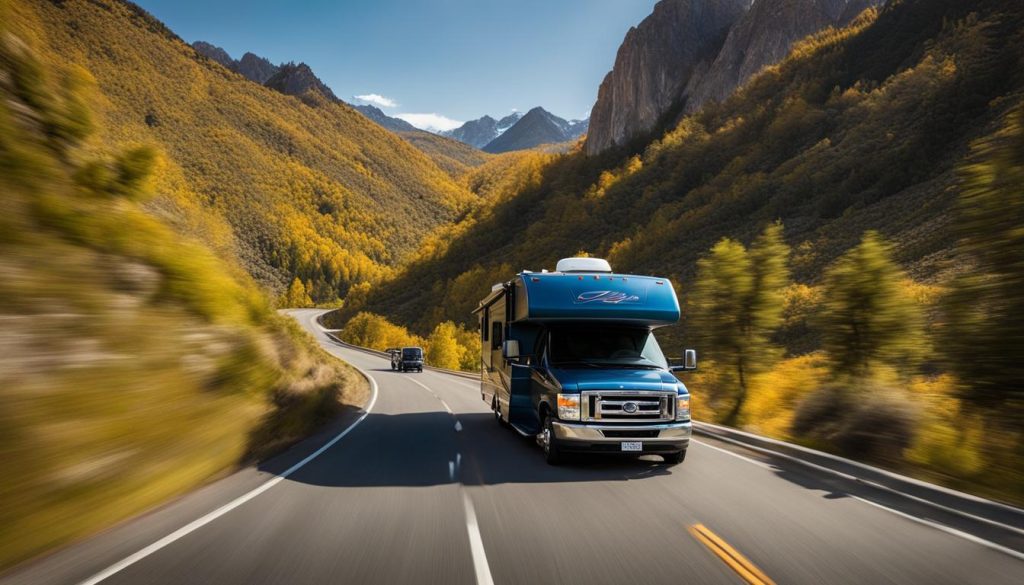
Pros and Cons of Class C Motorhomes
Class C motorhomes offer a range of benefits, but they also have their drawbacks. Here are some pros and cons to consider before purchasing a Class C motorhome.
Advantages of Class C Motorhomes
- Family-Friendly Floor Plans: Class C motorhomes are known for their spacious and well-designed floor plans, making them perfect for families. They often feature bunk beds or a cab-over bunk, providing extra sleeping space.
- Comfortable Driving Experience: Driving a Class C motorhome is similar to driving a large pickup truck, offering a comfortable and familiar experience for most drivers.
- No Need for a Separate Tow Vehicle: If you already have a daily driver, a Class C motorhome eliminates the need for a separate tow vehicle, saving you money and hassle.
- All the Conveniences of a Motorhome: Class C motorhomes come equipped with all the amenities you need for a comfortable camping experience, including a kitchen, bathroom, and living area.
- Better Master Bedrooms and Boondocking Capabilities: Compared to towable RVs, Class C motorhomes often offer larger and more comfortable master bedrooms. They are also well-suited for boondocking, with onboard tanks for water, electricity, and waste disposal.
Disadvantages of Class C Motorhomes
- Higher Pricing: Class C motorhomes are generally more expensive than towable options, making them a significant investment.
- Lower Fuel Efficiency: Due to their larger size and weight, Class C motorhomes tend to have lower fuel efficiency compared to smaller towable RVs.
- Higher Maintenance Costs: Maintenance and repairs for Class C motorhomes can be costly, especially when it comes to engine and mechanical components.
- Limited Residential Floor Plans and Exterior Storage: While Class C motorhomes offer ample space for living and storage, they may have more limited residential floor plans and exterior storage compared to larger motorhomes.
Consider these pros and cons carefully to determine if a Class C motorhome is the right choice for you. The next section will explore personal experiences and considerations when it comes to Class C motorhomes.
Personal Experiences and Considerations with Class C Motorhomes
When it comes to choosing a Class C motorhome, personal experiences and considerations play a vital role in the decision-making process. Every individual and family have unique needs and preferences, which must be taken into account before making a purchase.
Factors such as budget, desired floor plan and amenities, towing capabilities, and comfort while driving should all be carefully evaluated. It’s important to find a Class C motorhome that aligns with your specific requirements, whether you’re a solo traveler seeking simplicity or a family in need of extra space and sleeping arrangements.
One of the best ways to make an informed decision is to test drive and spend time in a Class C motorhome. This firsthand experience allows you to gauge the driving experience and overall livability, ensuring that the motorhome meets your expectations and suits your lifestyle.
While a Class C motorhome might not be the ideal choice for everyone, it can be an excellent option for those looking for a comfortable and convenient way to travel and camp. With its versatility, affordability, and a combination of motorhome and towable RV features, a Class C motorhome can provide you with unforgettable experiences on the road.
FAQ
How do I drive an RV Class C?
To drive an RV Class C, follow these steps:
1. Familiarize yourself with the vehicle’s controls and features.
2. Adjust your mirrors for optimal visibility.
3. Plan your route and be aware of low bridges, narrow roads, and weight restrictions.
4. Start the engine and adjust the seat and steering wheel to a comfortable position.
5. Use your turn signals and check your blind spots before changing lanes.
6. Accelerate and brake gently to avoid swaying or jerky movements.
7. Use caution when driving in windy conditions or on uneven surfaces.
8. Maintain a safe following distance and reduce your speed when necessary.
9. Take breaks every few hours to rest and stretch.
10. Practice parking and backing up in an open space before attempting it in a crowded campground or RV park.
What are some tips for driving an RV Class C?
Here are some driving tips for RV Class C:
1. Plan your route in advance and use GPS navigation systems designed for RV travel.
2. Take wide turns to avoid hitting curbs or other obstacles.
3. Be aware of the height and weight of your RV to avoid bridge collisions or overweight fines.
4. Use your side mirrors and rearview camera to monitor traffic around you.
5. Drive defensively and anticipate the actions of other drivers.
6. Use your brakes sparingly and downshift on steep descents to maintain control.
7. Be mindful of your RV’s clearance when entering parking lots or drive-throughs.
8. Check tire pressure regularly and inspect your RV for any signs of damage or wear.
9. Practice backing up and parking in an empty lot or with the help of a spotter.
10. Take a defensive driving course specific to RVs for additional safety and confidence on the road.
What are the basic operations of an RV Class C?
The basic operations of an RV Class C include:
1. Understanding the electrical and water systems, including how to connect to shore power and fill the freshwater tank.
2. Operating the slide-outs if your RV has them, ensuring proper clearance and stability.
3. Familiarizing yourself with the propane system, including how to turn the gas on and off and monitor the level.
4. Using the appliances, such as the stove, oven, refrigerator, and microwave.
5. Operating the HVAC system, including the furnace and air conditioner.
6. Knowing how to empty and maintain the black and gray water tanks.
7. Setting up the awning and outdoor accessories.
8. Understanding the leveling system and how to stabilize the RV.
9. Being able to connect and disconnect any towed vehicles or trailers safely.
10. Following the manufacturer’s instructions and consulting the RV’s owner’s manual for specific operations and maintenance procedures.
How should I handle an RV Class C?
Handling and maneuvering an RV Class C requires the following steps:
1. Take your time and drive at a safe and comfortable speed.
2. Be mindful of the vehicle’s size and height when navigating tight spaces or obstacles.
3. Be aware of overhead clearance, especially when driving under bridges or through covered areas.
4. Use your mirrors and rearview camera to check your surroundings and blind spots.
5. Anticipate the vehicle’s weight and size when braking, accelerating, and turning.
6. Take wider turns to accommodate the RV’s larger turning radius.
7. Practice parking and backing up in open areas to gain confidence before attempting it in crowded areas.
8. Maintain a safe following distance from other vehicles to provide enough space for braking and maneuvering.
9. Avoid sudden lane changes or abrupt movements that could cause the RV to sway or lose stability.
10. Be aware of the RV’s height and weight limitations to avoid any damage or accidents.
What are the pros and cons of Class C motorhomes?
Class C motorhomes have their advantages and disadvantages:
Pros:
– Family-friendly floor plans with ample sleeping and living space.
– Comfortable driving experience similar to a large pickup truck.
– Elimination of the need for a separate tow vehicle if you already have a daily driver.
– All the conveniences of a motorhome without the need for hitching and unhitching.
– More affordable compared to Class A motorhomes.
– Better master bedrooms and boondocking capabilities compared to towable RVs.
Cons:
– Higher pricing compared to towable options.
– Lower fuel efficiency compared to smaller RVs and towable trailers.
– Higher maintenance costs due to the complexity of motorized components.
– Limited residential floor plans and exterior storage compared to larger motorhomes.
– Requires a larger parking space and may have restrictions on where you can camp or park.
– Class C motorhomes may not offer the same level of luxury and amenities as larger Class A motorhomes.
What should I consider before purchasing an older Class C RV?
Before purchasing an older Class C RV, consider the following factors:
1. Budget: Determine how much you’re willing to spend on the RV itself and any necessary repairs or upgrades.
2. Mechanical Condition: Have the RV inspected by a qualified mechanic to identify any potential issues or necessary repairs.
3. Parts Availability: Research the availability of replacement parts for the make and model of the RV you’re considering.
4. Towing Capabilities: Consider if you need the RV to tow an additional vehicle and ensure it has the capacity to do so.
5. Interior Layout: Evaluate the floor plan to ensure it meets your needs and provides adequate living and storage space.
6. Maintenance History: Request maintenance records from the current owner to understand how well the RV has been maintained.
7. Test Drive: Take the RV for a test drive to assess its handling, comfort, and overall drivability.
8. Warranty: Check if the RV comes with any remaining warranty or if you can purchase an extended warranty for added protection.
9. Research: Read reviews and forums to learn about common issues or concerns with the specific make and model you’re considering.
10. Personal Preferences: Consider any additional features or amenities you desire, such as slide-outs, generator, or upgraded appliances.
What are some personal experiences and considerations with Class C motorhomes?
Personal experiences and considerations with Class C motorhomes vary depending on individual needs and preferences. Here are a few factors to consider:
– Budget: Class C motorhomes offer a range of price points, allowing you to find one that fits your budget.
– Size and Maneuverability: Class C motorhomes are smaller and easier to handle compared to larger motorhomes, making them suitable for first-time RVers or those who prefer a more compact option.
– Sleeping Capacity: Class C motorhomes typically offer additional sleeping space with features like a cab-over bunk, making them ideal for families or larger groups.
– Towing and Storage: Class C motorhomes have the advantage of being able to tow a small vehicle or trailer while providing ample interior storage for your belongings.
– Comfort and Amenities: Consider the amenities and features that matter most to you, such as a full bathroom, kitchen, entertainment system, and slide-outs for additional living space.
– Camping Style: Think about the type of camping you enjoy, whether it’s boondocking off-grid or staying at established RV parks, and choose a Class C motorhome that suits your preferred style.
– Resale Value: Research the resale value of the specific make and model you’re considering to assess its long-term value.
– Maintenance and Repairs: Factor in the potential costs of maintenance and repairs for the Class C motorhome you choose, including routine maintenance, insurance, and potential repairs.
Everyone’s experience with Class C motorhomes will be unique, so it’s essential to consider your specific needs and preferences before making a decision.

